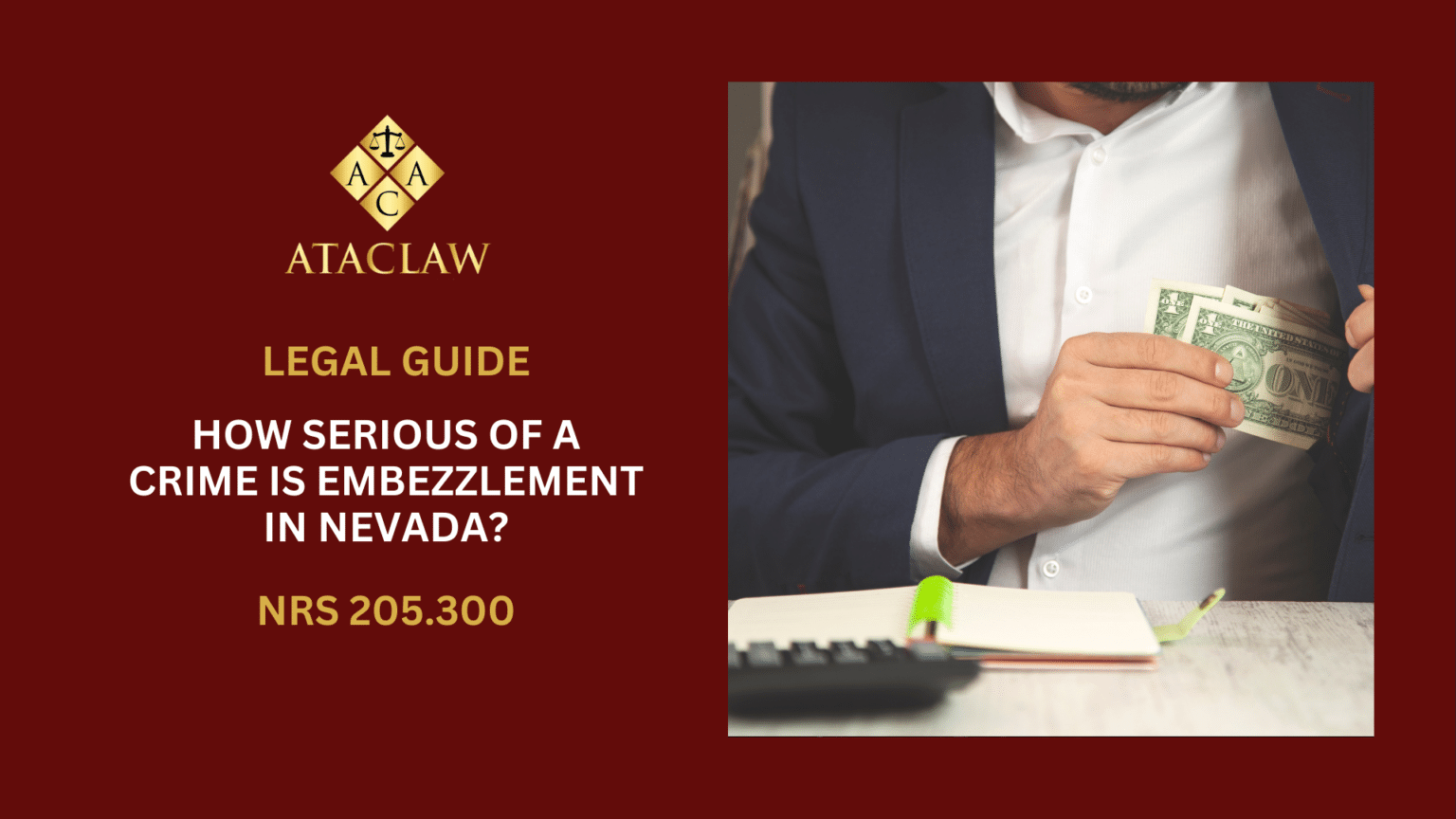Embezzlement in Nevada occurs when someone fraudulently appropriates funds or property that they have been entrusted with. NRS 205.300 criminalizes such actions clearly, stipulating that anyone entrusted with money, goods, or any property who then converts these for their own use – intending to steal or defraud the owner – is committing embezzlement.
Penalties:
- Misdemeanor: If the total value embezzled is less than $1,200, it’s charged as a misdemeanor.
- Felony: Embezzling $1,200 or more elevates the charge to a felony: Penalties can include incarceration, hefty fines, and the requirement to make restitution to the aggrieved party.
What Does Embezzlement Mean Under Nevada Law?
In Nevada, embezzlement entails the unauthorized taking of property by someone who was initially entrusted with its care—often referred to as employee theft or workplace fraud due to its frequent occurrence within the confines of employment.
- Example: Alex works as a cashier at a casino. One day, a customer gives him $1,000 to process. Instead of depositing this amount into his register, Alex decides to keep the money. Since the casino owned the money and entrusted Alex with it, his act is classified as embezzlement.
However, embezzlement isn’t confined to just employment settings. It can happen between any two parties where there exists a relationship of trust.
- Example: Samantha’s car is temporarily parked in a no-parking zone. Shortly after, Samantha asks a nearby pedestrian to re-park her car for a small fee. Agreeing to help, the pedestrian drives away with the car permanently instead. In this scenario, Samantha entrusted her car to the pedestrian, who then committed embezzlement.
If the pedestrian had not agreed to help Samantha and had taken the car, the crime would shift from embezzlement to grand larceny of a motor vehicle under NRS 205.228.
What Are the Legal Consequences for Embezzlement in Nevada?
In Nevada, the repercussions for embezzlement are determined by the monetary value of the property or funds involved, aligning closely with the penalties set forth for petty larceny (under NRS 205.240) and grand larceny (under NRS 205.220). The legal system classifies and penalizes embezzlement based on the following scales of value:
- Under $1,200: This is treated as a misdemeanor offense. Penalties can include up to six months in jail, fines reaching $1,000, and mandated restitution to the victim.
- $1,200 to less than $5,000: This range constitutes a Category D felony. The convicted can face one to four years in Nevada State Prison, fines up to $5,000 (at the discretion of the court), and must make restitution.
- $5,000 to less than $25,000: Falling under a Category C felony, penalties include one to five years in prison, restitution payments, and possibly a fine up to $10,000, depending on the judge’s decision.
- $25,000 to less than $100,000: This is classified as a Category B felony, with consequences including one to ten years in prison, the necessity for restitution, and a fine of $10,000.
- $100,000 or more: Also a Category B felony, this level of embezzlement carries the stiffest penalties: one to twenty years in prison, obligatory restitution, and a $15,000 fine.
It’s important to note that separate instances of misdemeanor embezzlement can be aggregated into a single felony charge if the total value of embezzled property within a six-month period reaches $1,200 or more.
Can Embezzlement Lead to Deportation for Non-Citizens in the U.S.?
Yes, embezzlement convictions can have severe immigration consequences, potentially resulting in deportation for non-citizens. Given the high stakes, it’s crucial for those charged to seek legal representation promptly. An experienced defense attorney, like those at ATAC LAW, may successfully negotiate with prosecutors to either have the charges dropped or reduced to a less severe, non-deportable offense.
How Can a Defense Attorney Assist in Embezzlement Charges in Nevada?
In Nevada, a pivotal aspect of embezzlement cases revolves around the accused’s intent—specifically, whether there was an intention to steal or defraud. Defense attorneys, such as those at ATAC LAW, often construct their defense on the premise that the accused did not plan to permanently appropriate the money or property that was trusted to them.
- Example: Imagine Kelly received a laptop from her employer to work from home over the weekend. If she forgets to return it the following Monday, it doesn’t automatically signify embezzlement. The lack of intent to permanently withhold the laptop from her employer plays a crucial role here.
Moreover, the absence of embezzlement is true if you genuinely believed you were using the property as the owner intended.
- Example: If Jordan’s employer gives him a company card for purchasing office necessities and he also uses it to refuel his car, believing it falls within permissible use, without the intent to deceive. If the employer never explicitly restricted such use, and Jordan’s belief was in good faith, it cannot be classified as embezzlement.
The onus is on the prosecution to prove guilt beyond a reasonable doubt. A skilled defense attorney can challenge the prosecution’s case by arguing that the evidence is either insufficient or unreliable to establish embezzlement beyond a reasonable doubt. ATAC LAW’s expert defense team is adept at handling these complexities, ensuring that justice is served while protecting the rights of those wrongly accused of embezzlement.
How Soon Can You Seal an Embezzlement Conviction Record in Nevada?
In Nevada, individuals with an embezzlement conviction can eventually have their records sealed, but it’s contingent on a mandatory waiting period after the case concludes:
- Misdemeanor: Wait time is 1 year.
- Category D felony: Wait time is 5 years.
- Category C felony: Wait time is 5 years.
- Category B felony: Wait time is 5 years.
If your case is dismissed, you’re eligible to seek a record seal immediately. It’s advisable to seal your records promptly, as embezzlement convictions may appear on background checks and adversely affect employment opportunities.
For further legal assistance and to discuss your case with an expert, don’t hesitate to contact ATAC LAW.




